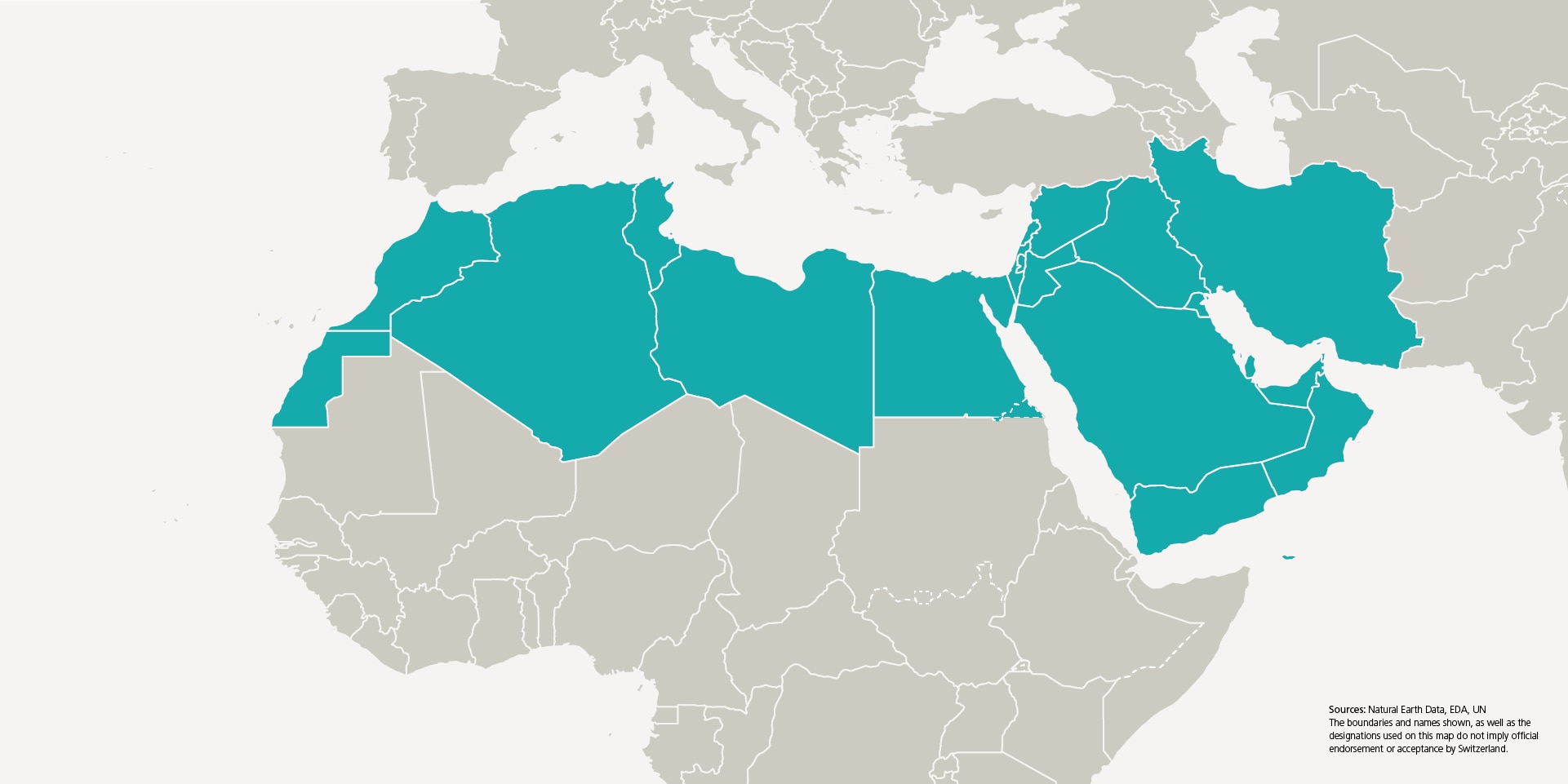Switzerland presents its Americas Strategy
The Federal Council adopted its strategy on the Americas at its meeting of 16 February 2022. Five priorities have been identified, and Switzerland has defined objectives and measures for each of these during the 2022-25 period. These objectives are based on Switzerland's foreign policy strategy, which sets out four thematic focus areas: peace and security, prosperity, sustainability, and digitalisation.

A portico with references to Swiss traditions welcomes visitors at the entrance to Nueva Helvecia in Uruguay. © Keystone
Many place names throughout the American continent sound very familiar to Swiss ears. New Glarus, Nova Friburgo, Villa Lugano or even Nueva Helvecia – all testify to the origins of their founders and reflect the long-standing cultural and economic relations Switzerland maintains with the countries of the Americas. "In many places, Swiss and their descendants have played a key role in shaping the development and fate of their new homelands – as presidents, ministers, diplomats, bridge builders or Super Bowl winners," writes Ignazio Cassis, President of the Swiss Confederation, in his foreword to the first Americas Strategy. Even today, the continent is home to around one-quarter of all Swiss living abroad.
Switzerland's relations with the countries of the Americas are as wide and varied as they are long-lasting. Regular political and sectoral dialogues are maintained with a large number of countries. Many Swiss companies have operated branches there for decades, providing employment to hundreds of thousands of people. But these countries are not all alike; that is why the Americas Strategy sets out five priorities for action, in which it aims to implement the four thematic focus areas of Swiss foreign policy in a way that is adapted to the needs of the region in question. These five priorities are: the United States, Canada, the 'jaguar economies' of Latin America, the FDFA's priority countries for international development cooperation and, lastly, the regional organisations in which Switzerland is a member or has observer status." In the interests of universality, Switzerland will continue to maintain a strong presence throughout the continent and seek to establish specific partnerships in mutually beneficial areas," continues the Head of the FDFA, Mr Cassis.
Why an Americas strategy?
Action specifically tailored to the very different situation in each of these regions is required to maximise the opportunities and address the challenges. The countries identified as part of the geographical priorities set out in the strategy vary in their forms of governance, respect for the environment and human rights, security situation, market size and economic potential.
The Americas Strategy is the fourth geographical follow-up strategy to the FPS 20−23, after MENA, Sub-Saharan Africa and China. It concerns all the departments and was drawn up with their involvement.
Switzerland has gained an excellent reputation through its decades of development cooperation and humanitarian aid in Latin America and the Caribbean. Its good offices, including the protecting power mandate for the United States in Cuba and vice versa (ended in 2015) and for the United States in Iran (since 1980) or for Iran in Canada (since 2019), have also earned it a great deal of credibility. The same is true of its engagement in civilian peacebuilding in Colombia.
The United States is Switzerland's main trading partner outside the European Union
The United States remains the dominant economic, military, political and technology power in the international system.
Its handling of global and regional challenges has a decisive influence on Switzerland. Examples include climate change, the design of multilateral organisations and the transatlantic security architecture. The Federal Council aims to further deepen bilateral cooperation with the United States. The two countries have a long history of bilateral relations, which are good and wide-ranging. The United States is Switzerland's second most important trading partner after the European Union. It is also an important hub for education and research, and a key partner in the technology sector. The Swissnex locations in Boston, New York and San Francisco and the agreement for scientific cooperation reflect the close cooperation between the two countries.
Pursuing cooperation with Canada in a variety of areas
Switzerland and Canada pursue the same objectives in many areas. Regular dialogues are held on policies, the economy, the environment and human rights as well as in the context of the Francophonie. A large number of bilateral agreements, treaties and joint declarations in various areas demonstrate how broad-based cooperation between the two countries is. Legal assistance, double taxation, the exchange of information, air transport, research and innovation are all areas in which cooperation is strong.
The 'jaguar economies': countries with considerable economic potential
Switzerland has very close relations with Latin America. The Strategy prioritises six countries that it refers to as the 'jaguar economies'. These countries – Argentina, Brazil, Chile, Colombia, Mexico and Peru – have markets of significant size and corresponding economic potential.
Mexico, Argentina and Brazil are also G20 members. Brazil is a global priority country for Switzerland. More generally, Latin America also remains important to Switzerland as a financial and commodities trading centre. Economic and trade relations carry potential for Swiss businesses, which already have a strong presence there.
Switzerland has signed EFTA free trade agreements with a number of countries. Concluding new economic agreements and renewing existing ones, along with signing and implementing the agreement with the Mercosur states, is one of the objectives.
Even so, the 'jaguar economies' also have – in some cases major – deficits regarding good governance and the protection of human rights. Switzerland will continue to support Colombia in its civilian peacebuilding efforts and conduct bilateral human rights dialogues with Mexico and Brazil-
Bilateral development cooperation work to be discontinued by 2024
Another five Latin American countries have been grouped together as a further priority for action. These are regions in which the FDFA runs bilateral development cooperation programmes, i.e. Bolivia, Cuba, Haiti, Honduras and Nicaragua.
As stated in the International Cooperation Strategy 2021−24, bilateral development cooperation efforts in Latin America are to be phased out by 2024. The Americas Strategy therefore paves the way for a responsible withdrawal. In this context, international cooperation instruments such as humanitarian aid, global programmes, the promotion of peace and human rights, and SECO's economic development cooperation will remain in use where fit for purpose. At the same time, cooperation with the private sector and in scientific, educational, health and environmental affairs is to be encouraged.
Important multilateral partners
A range of regional organisations in which Switzerland is either a member or has observer status, such as the Inter-American Development Bank (IDB) and the Organization of American States (OAS), form another priority.
The countries of the Americas are often important partners for Switzerland in the multilateral arena, and especially when it comes to combating climate change and promoting international human rights law.
In its Foreign Policy Strategy 2020–23, the Federal Council made developing cooperation with regional organisations a priority of its policy on the Americas, with the focus to be placed on governance, human rights, the fight against corruption and impunity, economic development and sustainability, disaster risk reduction, innovation and vocational education and training. Switzerland's presence in these organisations undoubtedly raises its foreign policy profile as a credible and capable partner.
Complementary strategies for coherent foreign policy
- In its Foreign Policy Strategy 2020–23, published at the end of January 2020, the Federal Council set out overall objectives, informed by an analysis of the current global environment and the developments and trends likely to affect Switzerland in years to come.
- For Switzerland to implement its foreign policy in a coordinated and coherent manner in all regions of the world, its strategies must complement each other. While the Foreign Policy Strategy formulates the overall objectives and approach, the regional strategies (which include the Americas Strategy) flesh out the details of Swiss foreign policy in different parts of the world.
- The regional strategies are complemented by thematic strategies, which set priorities in specific areas. These include the International Cooperation Strategy, the Digital Foreign Policy Strategy and the Strategy for Communication Abroad.



